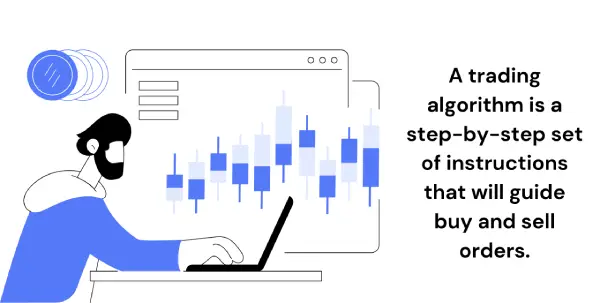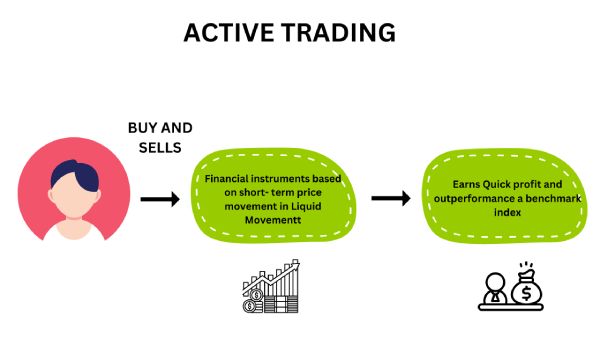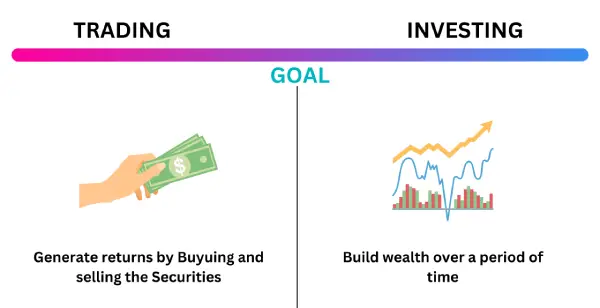Jamie, a seasoned trader who had stepped away from the stock market 15 years ago, decided to jump back into active trading. To his surprise, he found a drastically different landscape due to technological advancements. Seeking guidance, he turned to his friend Alex, a successful trader.

“I have to admit, stock trading has changed profoundly. Many aspects are completely new to me,” Jamie said. “I’ve been hearing a lot about the rise of algorithmic trading in India. Can you explain what it is?”
“Certainly,” Alex replied. “Computers have become crucial in stock trading, much like in other fields. Algorithmic trading, or algo trading, has emerged due to the increasing capabilities of computers. It involves using algorithms to automate trading decisions and execute trades let me tell you in detail.”
What is Algorithmic Trading?
Algorithmic trading, also known as algo trading, involves using computer algorithms to automate trading decisions. These algorithms follow predefined rules and strategies to execute trades at high speeds and frequencies, often beyond the capabilities of human traders.

Key Components
1. Algorithms – Set of rules or instructions.
2. Historical Data – Used for backtesting strategies.
3. Execution Systems – Platforms that execute trades.
4. Risk Management – Systems to manage and mitigate risks.
5. Market Data Feeds – Real-time data streams from exchanges.
Pros and Cons of Algorithmic Trading
| PROS OF ALGO TRADING | CONS OF ALGO TRADING |
| Speed and Efficiency-Algorithms can process vast amounts of data and execute trades in milliseconds. | Complexity-Developing and maintaining algorithms require specialized knowledge and skills. |
| Eliminates Human Emotion Reduces the impact of emotions such as fear and greed on trading decisions. | Technology Dependence- Highly reliant on technology, making it vulnerable to technical failures. |
| Consistency- Ensures a consistent trading approach without deviations. | Initial Costs-High costs associated with development and infrastructure. |
| Backtesting – Allows strategies to be tested on historical data to evaluate performance. | Market Risks- Algorithms can amplify losses in volatile markets if not properly managed. |
| Scalability – Can handle large volumes of trades efficiently. | Regulatory Risks- Subject to strict regulatory scrutiny and compliance. |
How Algorithmic Trading Helps Day-Active Traders and Investors
Day-Active Traders

Day-active traders engage in short-term trading strategies to capitalize on intraday market movements. Algorithmic trading offers several advantages to this group:
- Speed Algorithms execute trades almost instantaneously, allowing traders to take advantage of fleeting market opportunities.
- Volume Trading- This enables handling large volumes of trades, which is critical for strategies like scalping.
- Real-time Analysis-Continuously analyzes market conditions, ensuring timely decision-making.
- Reduced Stress-Automates repetitive tasks, reducing the cognitive load on traders.
Traders and Investors

For traders and investors with a longer-term focus, algorithmic trading provides distinct benefits:
- Diversification- Allows the implementation of multiple strategies simultaneously, enhancing portfolio diversification.
- Risk Management – Automated risk management rules help in protecting capital.
- Efficiency – Streamlines the trading process, making it more efficient and cost-effective
- Decision-Making Helps make objective decisions based on data and predefined criteria, reducing biases.
- Performance Tracking Algorithms provide detailed performance metrics, aiding in strategy evaluation and adjustment.
Is Algorithmic Trading Legal?
Yes, algorithmic trading is legal. There are no rules or laws that limit the use of trading algorithms. Some investors may contest that this type of trading creates an unfair trading environment that adversely impacts markets. However, there’s nothing illegal about it.
What Programming Language Do Algorithmic Traders Use?
Because it is highly efficient in processing high volumes of data, C++ is a popular programming choice among algorithmic traders. However, C or C++ are both more complex and difficult languages, so finance professionals looking for entry into programming may be better suited to transitioning to a more manageable language such as Python.
CONCLUSION
In conclusion, when it comes to the basics of algo trading software, Valvenet Technologies emerges as the best product provider. With its emphasis on functionality, user experience, and customer support, Valvenet Technologies continues to set the standard for algo trading software in the industry.





